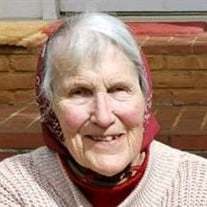Dublin Core
Title
Jane and Mike Newton Oral History Interview
Description
In this interview, Mike and Jane Newton discuss their extensive experience in tree farming and land management. They also recount the experience of transforming their property, initially purchased in 1962, into a thriving forest ecosystem. In this, the conversation delves into their family's involvement in tree farming operations. Both Mike and Jane emphasize the importance of involving their children from an early age, teaching them the values of hard work and forest management. They note as well that the children's gradual development into skilled workers led them to explore jobs beyond the family farm, leaving the couple with the primary responsibility of maintaining the property.
The Newtons likewise provide insights into the ecological history of their land, discussing how the area had been used for farming and pasturing before they took ownership. They describe the reforestation process, noting how the land had undergone soil loss and compaction due to historical agricultural practices. They note that, by planting a variety of tree species, they managed to rehabilitate the soil, leading to a significant increase in organic matter and overall soil health.
From there, the Newtons stress the importance of maintaining fire breaks in their dry summer climate. They discuss their annual application of herbicides to create these breaks, which not only prevent fires from spreading but also serve as safe spaces for potential backfires in case of emergencies. They also discuss the ecological impact of introducing non-native species into the ecosystem and note the significance of mixed-species stands in ensuring the survival of some trees against pests and disturbances. The interview ends with both Mike and Jane expressing a sense of fulfillment and satisfaction with their work and accomplishments.
Mike Newton (1932-2022) was a professor of forest ecology at Oregon State University from 1959-1999. Jane Newton (1929-2017), Mike's wife of 63 years, was a founding member of Oregon Women in Timber and active volunteer for many Benton County organizations.
The Newtons likewise provide insights into the ecological history of their land, discussing how the area had been used for farming and pasturing before they took ownership. They describe the reforestation process, noting how the land had undergone soil loss and compaction due to historical agricultural practices. They note that, by planting a variety of tree species, they managed to rehabilitate the soil, leading to a significant increase in organic matter and overall soil health.
From there, the Newtons stress the importance of maintaining fire breaks in their dry summer climate. They discuss their annual application of herbicides to create these breaks, which not only prevent fires from spreading but also serve as safe spaces for potential backfires in case of emergencies. They also discuss the ecological impact of introducing non-native species into the ecosystem and note the significance of mixed-species stands in ensuring the survival of some trees against pests and disturbances. The interview ends with both Mike and Jane expressing a sense of fulfillment and satisfaction with their work and accomplishments.
Mike Newton (1932-2022) was a professor of forest ecology at Oregon State University from 1959-1999. Jane Newton (1929-2017), Mike's wife of 63 years, was a founding member of Oregon Women in Timber and active volunteer for many Benton County organizations.
Creator
Jane Newton and Mike Newton
Source
Starker Forests Community Oral History Collection (OH 038)
Publisher
Special Collections and Archives Research Center, Oregon State University Libraries
Date
May 14, 2010
Contributor
Gary Blanchard
Format
Born Digital Video
Language
English
Type
Oral History
Identifier
oh38-newton-mike-and-jane-20100514
Oral History Item Type Metadata
Interviewer
Gary Blanchard
Interviewee
Jane and Mike Newton
Location
Newton property near Philomath, Oregon
Original Format
Born Digital Video
Duration
0:34:53
OHMS Object
Interview Format
video
